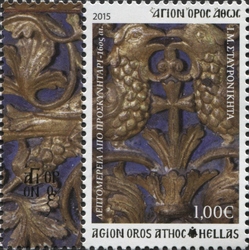Stamp: Agion Oros Athos Wood Carving C - H.M. of Stavroniketa (16th Century) (Greece, Mount Athos 2015)
Agion Oros Athos Wood Carving C - H.M. of Stavroniketa (16th Century) (Greece, Mount Athos 2015)
08 September (Greece, Mount Athos ) within release Agion Oros Athos Wood Carving C goes into circulation Stamp Agion Oros Athos Wood Carving C - H.M. of Stavroniketa (16th Century) face value 1.00 Euro
| Stamp Agion Oros Athos Wood Carving C - H.M. of Stavroniketa (16th Century) in catalogues | |
|---|---|
| WADP Numbering System - WNS: | WAD:XK014.15 |
Stamp is square format.
Number in set - 5||(show set). Layout - sheet of 16. Issuing - Hellenic Post. Printer - Joh Enschedé Security PrintersAlso in the issue Agion Oros Athos Wood Carving C :
- Stamp - Agion Oros Athos Wood Carving C - H.M. of Simonos Petras face value 0.30;
- Stamp - Agion Oros Athos Wood Carving C - H.M. of Philotheou (14th Century) face value 0.50;
- Stamp - Agion Oros Athos Wood Carving C - H.M. of Aghiou Pavlou (18th Century) face value 0.72;
- Stamp - Agion Oros Athos Wood Carving C - H.M. of Stavroniketa (16th Century) face value 1.00;
- Stamp - Agion Oros Athos Wood Carving C - H.M. of Karakallou (18th Century) face value 1.62;
Stamp Agion Oros Athos Wood Carving C - H.M. of Stavroniketa (16th Century) it reflects the thematic directions:
Sculpture is the branch of the visual arts that operates in three dimensions. Sculpture is the three-dimensional art work which is physically presented in the dimensions of height, width and depth. It is one of the plastic arts. Durable sculptural processes originally used carving (the removal of material) and modelling (the addition of material, as clay), in stone, metal, ceramics, wood and other materials but, since Modernism, there has been almost complete freedom of materials and process. A wide variety of materials may be worked by removal such as carving, assembled by welding or modelling, or moulded or cast.
In European academic traditions, fine art is made primarily for aesthetics or creative expression, distinguishing it from decorative art or applied art, which also has to serve some practical function, such as pottery or most metalwork. In the aesthetic theories developed in the Italian Renaissance, the highest art was that which allowed the full expression and display of the artist's imagination, unrestricted by any of the practical considerations involved in, say, making and decorating a teapot. It was also considered important that making the artwork did not involve dividing the work between different individuals with specialized skills, as might be necessary with a piece of furniture, for example. Even within the fine arts, there was a hierarchy of genres based on the amount of creative imagination required, with history painting placed higher than still life.

